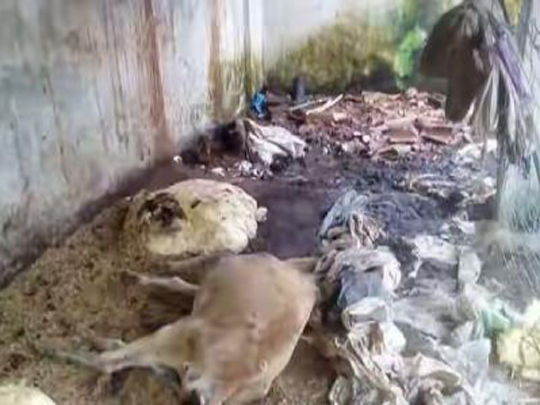Raipur, Aug 14: At least two hundred cows died of "starvation and lack proper care" in past three months at a facility getting state aid in BJP-ruled Chhattisgarh's Kanker district.
 After the opposition raised the issue, the government order a probe and weekly inspection of all cow shelters in the central Indian state. BJP considers cow as mother.
After the opposition raised the issue, the government order a probe and weekly inspection of all cow shelters in the central Indian state. BJP considers cow as mother.
The incident comes close on the heels of a similar case coming to light in BJP-ruled Rajasthan, where it was alleged that hundreds of cows had died in state-run Hingonia cow shelter due to "mismanagement and lack of facilities".
Former Chhattisgarh Chief Minister Ajit Jogi, who recently floated a new party Chhattisgarh Janata Congress, alleged that over 200 cows died in the government-aided shelter home in past three-four months and that the matter was being covered-up. He also sought a high-level probe.
Chhattisgarh's Agriculture Minister Brijmohan Agrawal ordered an inquiry into the death of livestock at 'Kamdhenu Gau Sewa' centre at Karramad village in Durgkondal development block of Kanker, an official said here today.
The directive in this regard was issued last evening following which the probe team today visited the cow shelter home, he said. Agrawal has also asked animal husbandry department officials to conduct inspection of all cow shelter homes across the state every seventh day and ensure proper sanitation and hygiene there.
While Jogi's party claimed that over 200 cows died at the shelter home in last three-four months, Kanker district Collector said 22 cows died there since August 1. "I have received information about death of 22 cows as of today morning since August 1 at Kamdhenu Gau Sewa shelter home," Collector Shammi Abidi told PTI.
Taking a serious note of the incident, Agrawal spoke to veterinary services director, Kanker collector, secretary and registrar of state Gau Sewa Ayog, besides other officials, and decided to send an investigation team to take stock of the situation at the shelter home, the official said, adding that the minister has asked for a probe report at the earliest.
Agrawal has also said that stern action will be taken against those found guilty for the death of animals after the inquiry, he mentioned. According to Abidi, the inspection team was at the shelter home for investigation while four-five veterinary teams have also been pressed into service to take care of the other ailing cows there.
The exact cause of the deaths was yet to be ascertained as the blood samples of the carcasses have been sent to labs and reports are awaited, she further said. However, prima facie it appears that the cows died of starvation and lack proper care as they were not fed properly, she said.
The shelter home was overcrowded as it has a capacity of around 80 animals against which nearly 300 animals were kept there, she said. Meanwhile, the collector also slapped a notice on the shelter home's owner seeking his response as to why he should be funded by government as he failed to feed the animals properly.
Agarwal also directed veterinary officials to provide proper medication to the livestock at regular intervals. Ajit Jogi, while talking to reporters here last evening, alleged that, "Our team recently visited the shelter home and found that around 203 cows have died in past three months there. The owners buried the carcasses in haste at the premises itself to cover up the matter."
He also alleged that the state government aid to the shelter home was being siphoned-off instead of being used for fodder or to treat the cattle.
Also Read: Mothers' rot, die in hordes: BJP govt's unholy treatment of holy cow' exposed





Comments
Where is naren and Viren....son of GO....
Mother's dying and stinking....sons are busy raping and looting....and moral policing.....
first they need to take care of their own family then go for animals...
Killing Both Humans and the Animals... As if they are the ones who give life to them.... Where are these Stupid oppressors who claim to take care of the cows, A reality which will be EXPOSED whenever there is Lies , evil and stealing in it.
ISLAM says a day will come to judge all these... On that day no cheddi, no BD, No VHP's will come to rescue YOU for the EVIL you do now... Beware cheddis are destroying YOUR youth and life of the oppressed and their family... Recognize the real Culprits... Think and PONDER life is not a play.
Send Thogadia and Sharan Pumpwell along with the Indian Army to Bury their MOTHER (Cow).Who died from hunger.More over now a days a street Dogs have much value than so called Mother(Cow).
Now the result of the BJP governments populist policy of banning beef can be seen.
Where is Maneka Gandhi now?
Mr. Togadia,
Please send your rescue team, or else don't compare mothers with animals
India can not feed 1.2 billion population properly, why on the hell they took this responsibility. Sorry to hear this message....heart breaking situation....
Add new comment